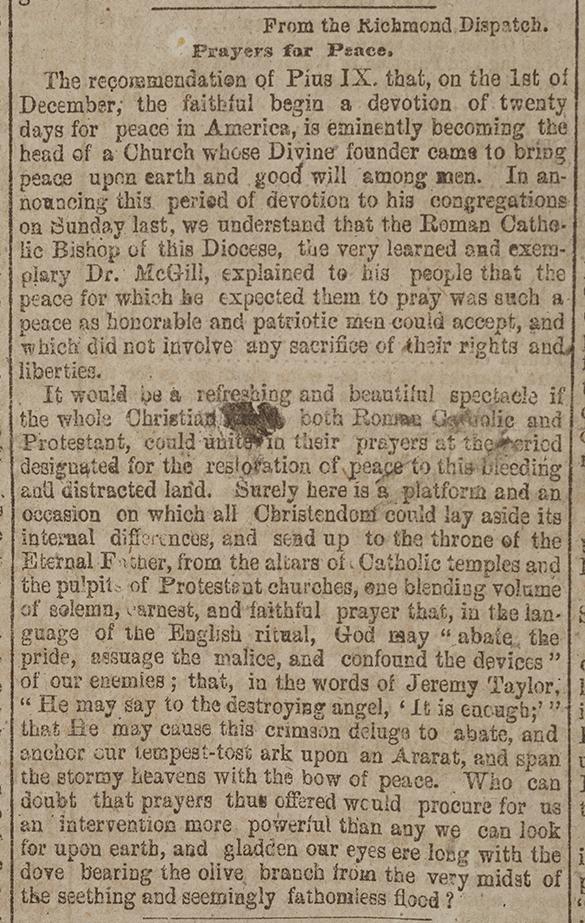
Item: “Prayers for Peace” (editorial), The Daily Journal (Wilmington, N.C.), 28 November 1863, page 2 column 2.
Transcription:
From the Richmond Dispatch [The Daily Dispatch, 26 November 1863]
Prayers for peace.
The recommendation of Pius IX. that, on the 1st of December, the faithful begin a devotion of twenty days for peace in America, is eminently becoming the head of a Church whose Divine founder came to bring peace upon earth and good will among men. In announcing this period of devotion to his congregations on Sunday last, we understand that the Roman Catholic Bishop of this Diocese, the very learned and exemplary Dr. McGill, explained to his people that the peace for which he expected them to pray was such a peace as honorable and patriotic men could accept, and which did not involve any sacrifice of their rights and liberties.
It would be a refreshing and beautiful spectacle if the whole Christian world, both Roman Catholic and Protestant, could unite in their prayers at the period designated for the restoration of peace to this bleeding and distracted land. Surely here is a platform and an occasion on which all Christendom could lay aside its internal differences, and send up to the throne of the Eternal Father from the altars of Catholic temples and the pulpits of Protestant churches, one blending volume of solemn, earnest, and faithful prayer that, in the language of the English ritual, God may “abate the pride, assuage the malice, and confound the devices” of our enemies; that, in the words of Jeremy Taylor, “He may say to the destroying angel, ‘It is enough;'” that He may cause this crimson deluge to abate, and anchor our tempest-tost ark upon an Ararat, and span the stormy heavens with the bow of peace. Who can doubt that prayers thus offered would procure for us an intervention more powerful than any we can look for upon earth, and gladden our eyes ere long with the dove bearing the olive branch from the very midst of the seething and seemingly fathomless flood?
Note: The source of the quote, “abate the pride, assuage the malice, and confound the devices of our enemies” is derived from the Chirch of England’s The Book of Common Prayer. In The Annotated Book of Common Prayer (edited by Rev. John Henry Blunt, I866) the prayer—for use “In the time of War and Tumults”— uses the possessive, ” . . . abate their pride, assuage their malice, and confound their devices . . . .” (http://catalog.hathitrust.org/Record/008913062)
Citation: The Daily Journal (Wilmington, N.C.), 28 November 1863, page 2, column 2. North Carolina Collection, Wilson Special Collections Library, University of North Carolina at Chapel Hill; call number C071 Z.

